|
Our
portrayal is a July 1, 1863 campaign impression of the 6th Wisconsin
Infantry Regiment Company C. At that time the 6th Wisconsin was
the 1st Brigade, 1st Division, 1st Army Corps of the Army of the
Potomac. We try to portray the 6th Wisconsin at every event we
attend, but sometimes we also portray a Western Federal company.
The following is a list of the required (and optional) uniform
and equipment you will need to achieve your impressions. Also
included are the recommended vendors where one should purchase
each item. The best vendors are listed in black, while the last
alternatives are in gray.

1.
Headgear
A.
M1858 Dress Hat (Hardee Hat)
The dress hat should be constructed of black wool felt with
a 3 inch brim edged with two lines of stitching. There should
be a 3/8-inch to 5/16-inch hat-band knotted on the left
of the hat. The crown should be 5 1/2 inches tall, with
a paper label attached on the bottom. A black or maroon
leather sweatband should also be inside the hat. No hat
brass, hat cords or ostrich feather is needed. |
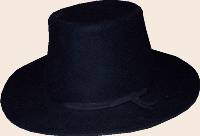
Hardee Hat by
Clearwater Hats |
Venders:
Tim Bender
Hats, Dirty
Billy's Hats, Jersey
Skillet Licker, Clearwater
Hat Company, Tim
Allen Hats
B.
Forage Cap
The 1858 pattern forage cap can
either be the type I or the type II. Both should be made
of dark blue wool with a black or brown lining and black
leather sweatband inside. The patent leather visor should
not be rolled like a modern baseball cap. No hat brass is
necessary. |
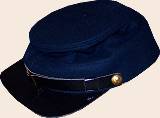
Type II Forage Cap by Nick Sekela (Skillet
Licker) |
Vendors:
Jersey
Skillet Licker,
Dirty
Billy's Hats
C.
Civilian Hat
A civilian hat can be used when
portraying a Western Federal soldier. We do not portray
the 6th Wisconsin at every event we attend. |
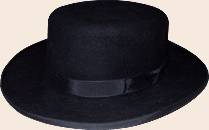
Flat Top Bowler Hat by Tim Bender Hats
|
Vendors:
Tim Bender
Hats, Dirty
Billy's Hats, Clearwater
Hat Company, Tim
Allen Hats
2.
Shirts
|
A.
Federal Issue Shirt
This was the most common shirt worn by Federal soldiers.
These were issued in only one size! They were made of
domet wool flannel in gray, off-white, blue, or gray.
They should have 5 paper-backed tin buttons, one on each
cuff and three on the front placket.
|

Federal Blue Variant Shirt by Nick Sekela
(Skillet Licker) |
Vendors:
Jersey
Skillet Licker, CJ
Daley
|
B.
Civilian Shirt
Must be made of a 100% natural cotton fabric. Prints
must be period-correct. Buttons may be wood, glass, bone,
mother-of-pearl, procelain, or even paper-backed tin.
|
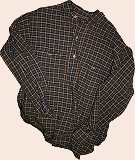 Civilian Shirt by Nick Sekela (Skillet
Licker)
Civilian Shirt by Nick Sekela (Skillet
Licker) |
Vendors:
Jersey
Skillet Licker, CJ
Daley, Quartermaster
Shop
3.
Coats
A.
Frock Coat
The 6th Wisconsin and Iron Brigade were issued Frock
Coats. They are made of dark blue wool with a diagonal
weave, with infantry blue piping on the collar and cuffs.
Down the front of the coat are nine general service eagle
buttons, with two general service eagle buttons on each
cuff. The bottom of the skirt should reach about half
way between the hip and the knee. The inside is lined
with black or brown polished cotton lining, with the sleeves
being lined with cotton muslin. There should be no internal
pocket in this coat, and all buttonholes should be hand
sewn. |
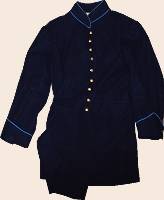
Federal Frock Coat |
Vendors:
Jersey
Skillet Licker, CJ
Daley, County
Cloth, C&D
Jarnagin, Quartermaster
Shop
B.
Fatigue Blouse (Sack Coat)
Should be made of indigo dyed wool with a diaganol weave.
There are 4 general service eagle buttons down the front,
and one kidney shaped or square pocket inside the coat.
The coat should have a falling collar and vented cuffs,
and hand sewn buttonholes. Lined and unlined sack coats
are acceptable in any of the documented patterns (J.T.
Martin, Schuylkil, Deering). Lined coats should have a
wool flannel, linen or cotton lining, with cotton muslin
lining in the sleeves. Unlined coats must have flat-felled
seams. |
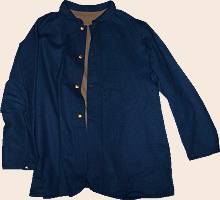
J.T. Martin Sack Coat by Nick Sekela
(Skillet Licker) |
Vendors:
Jersey
Skillet Licker, CJ
Daley, Camp
Randall Quartermaster, C&D
Jarnagin, Quartermaster
Shop
4.
U.S. Infantry Trowsers
| Foot
pattern trowsers should be made of a sky blue kersey wool
with a diaganol weave. They are high-waisted, and should
be worn at the navel. Trowsers should include a watch pocket,
and either mule ear or slit type pockets. Either 4 or 6
paper backed tin suspender buttons should be present along
with 5 paper backed tin fly buttons. All buttonholes should
be hand sewn. Any of the documented pattern trowsers are
acceptable (JT Martin, Schuylkil, Deering). |

J. T. Martin Trowsers by Nick Sekela (Skillet
Licker) |
Vendors:
Jersey
Skillet Licker, CJ
Daley, County
Cloth, Stoney
Brook, C&D
Jarnagin, Quartermaster
Shop
5.
Suspenders
| Suspenders
should be made of cotton or linen with leather end tabs
and the correct adjustment buckles. They are usually between
1 and 1.625 inches wide. "Poor boy" type suspenders
are also acceptable. |

Suspenders by Nick Sekeka (Skiller Licker)
|
Vendors:
Jersey
Skillet Licker, Regimental
Quartermaster, CJ
Daley
6.
Drawers
| Any
documented pattern is acceptable. They should be constructed
of canton flannel. |

Drawers by CJ Daley |
Vendors:
Jersey
Skillet Licker,
CJ Daley
7.
Socks
| Wool
or cotton, of period construction. Acceptable colors include
gray, brown, off-white, red, green. |
 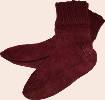
Federal Issue Socks by CJ Daley, Civilian
Socks by Mrs. Lawson |
Vendors:
Jersey
Skillet Licker, CJ
Daley, Regimental
Quartermaster, Evergreen
Acres Farm
8.
Bootees or Brogans
Brogans will be of black dyed rough out leather with
leather shoe laces. Soles can either be pegged or sewn.
You may wish to also purchase heel plates and/or hob nails. |
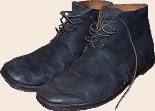
Brogans by Mattimore Harness |
Vendors:
Mattimore
Harness, Missouri
Boot and Shoe, Jersey
Skillet Licker, Orchard
Hill Sutlery, C&D
Jarnagin
9.
Gaiters
| Gaiters
should be made of white canvas, and have a leather strap
and buckle at the top. They must also use leather thong
closures. |
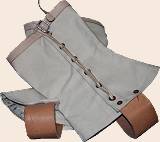
Gaiters by Jersey Skillet Licker
|
Vendor:
Jersey
Skillet Licker
10.
Vest/Waistcoat
| Military
and civilian styles are both acceptable. Either style should
be of the correct materials and should fit rather tight. |
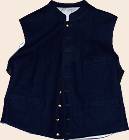
Military Style Vest |
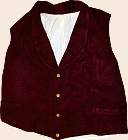
Civilian Vest by Nick Sekela
|
Vendors:
Jersey
Skillet Licker, CJ
Daley, C&D
Jarnagin, Quartermaster
Shop
11.
Greatcoat (Overcoat)
| Foot
pattern greatcoats should be contructed of sky blue kersey
wool with a diaganol weave. The inside lining should be
a brown or blue wool, with cotton muslin sleeve lining.
There are five general service eagle buttons down the front
of the coat, with 6 small eagle buttons on the cape. The
skirt should be left unhemmed, and buttonholes should be
hand sewn. |
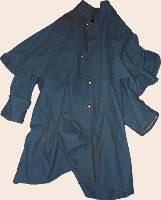
Foot pattern greatcoat |
Vendors:
Jersey
Skillet Licker,
CJ Daley,
County
Cloth, C&D
Jarnagin, Quartermaster
Shop
12.
U.S. Issue Blanket
| The
blanket can either be the gray blanket with black end stripes,
or the brown blanket with darker brown end stripes. Either
version must be of a documented pattern, have the correct
diaganol weave, and should have a 4 inch "US"
stitched in the center of the blanket. Approximate size
is 7 feet by 5 feet 6 inches, and should weigh about 5 pounds. |

Keagy Noble Federal Blanket
|
Vendors:
C&D
Jarnagin (Keagy Noble Blanket), Waterside
Woolen Mills (Keagy Noble Blanket), Quartermaster
Woolens (Abe Thomas blanket), Jersey
Skillet Licker, Fall
Creek Sutlery (Grey blanket)
13.
Gum Blanket/Ground Cloth/Poncho
| Made
of white linen with a rubber coating on one side and brass
grommets. Ponchos are essentially the same except for a
small slit in the center with a tin button closure. Also
acceptable are the painted ground clothes. |

Gum Blanket and Poncho by C&D Jarnigan
|

Painted Ground Cloth by Dell's Leatherworks
|
Vendors:
C&D
Jarnagin, Jersey
Skillet Licker, Dell's
Leather Works, Fall
Creek Sutlery
14.
Shelter Half
| A
shelter half is not needed, but if you wish to use a tent
it must be of a correct pattern |
|
Vendors:
Jersey
Skillet Licker, Haversack
Depot
15.
Haversack
| Haversacks
were made of tarred (painted) linen or cotton drilling.
Inside is a cotton ration bag attached by three buttons.
Buttonholes should be hand sewn. The shoulder strap should
be approximately 45 inches in length, and should be adjusted
so that the top of the haversack rides no lower than the
waistbelt. The haversack is intended for carrying rations,
utensils, plate and tin cup, not for storing "haversack
stuffers!" |
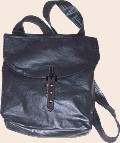
Haversack by Dell's Leatherworks
|
Vendors:
Missouri
Boot and Shoe, Orchard
Hill Sutlery, Dell's
Leather Works, Jersey
Skillet Licker, Haversack
Depot, Fall
Creek Sutlery
16.
Canteen
| M1858
smoothside canteen should be made of tin. Cork stopper should
be attached with either a cotton cord or chain and the canteen
cover can be a gray or brown jean cloth or even pieces of
an old federal blanket. The sling can be either leather
or cloth. |
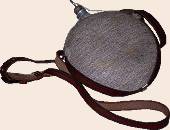
Canteen by Dell's Leatherworks
|
Vendors:
Orchard
Hill Sutlery, Jersey
Skillet Licker, C&D
Jarnagin, Dell's
Leather Works, Fall
Creek Sutlery
Correct
canteen covers can be purchased from Orchard
Hill Sutlery or Dell's
Leather Work
17.
Cartridge Box and Sling
| Either
the M1861 or M1857 .58 caliber cartridge box is acceptable.
Boxes are made of black leather. Cartridge box tins (2)
are required. The cartridge box plate and breast plate should
be attached with a small piece of leather. The sling is
made of black bridle leather, 64 inches in length and 2.25
inches wide. When properly adjusted, the top of the cartridge
box will sit even with the bottom of the waistbelt. |
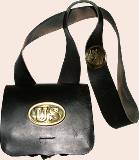
Cartridge Box and Sling by C&D Jarnagin |
Vendors:
Missouri
Boot and Shoe, C&D
Jarnagin, Orchard
Hill Sutlery, Dell's
Leather Works, Jersey
Skillet Licker, Fall
Creek Sutlery
18.
Cap Box
| Black
leather, either standard or shield front box is acceptable.
Should contain a cone pick loop and a strip of wool inside. |

Cap Box by C&D Jarnigan
|
Vendors:
Missouri
Boot and Shoe, C&D
Jarnagin, Orchard
Hill Sutlery, Dell's
Leather Works, Jersey
Skillet Licker,
Fall
Creek Sutlery
19.
Leather Waistbelt and Buckle
| Belts
should be 1.9 inches wide and 38.5 inches in length, made
of either black buff leather or bridle leather. It should
also have either a leather or brass belt keeper (leather
preferred), and a lead backed oval belt plate (puppy paw
pattern preferred). |

Waistbelt by C&D Jarnigan, Buckle by
Orchard Hill |
Vendors:
Missouri
Boot and Shoe, C&D
Jarnagin, Orchard
Hill Sutlery, Dell's
Leather Works, Jersey
Skillet Licker, Fall
Creek Sutlery
20.
U.S. Pattern Bayonet Scabbard
Must be a U.S. pattern made of
black leather with a brass tip. Both the two rivet and seven
rivet styles are acceptable. |

2 Rivet Scabbard by C&D Jarnigan |
Vendors:
Missouri
Boot and Shoe, C&D
Jarnagin, Orchard
Hill Sutlery, Jersey
Skillet Licker, Fall
Creek Sutlery
21.
Knapsack
| The
Federal issue double bag knapsack should be made of black
painted canvas with black dyed leather straps. Buckles should
be japanned or painted black, and hooks should be brass.
You may elect to wear a blanket roll instead of a knapsack. |
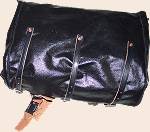
Double Bag Knapsack by Jersey Skillet Licker
|
Vendors:
Jersey
Skillet Licker, Missouri
Boot and Shoe
22.
Rifle-Musket and Bayonet
| The
1861, 1863, and 1842 Springfield rifles and the 1853 Enfield
rifle are all acceptable, but the 1861 Springfield is preferred.
Obtain a "defarbed" rifle-musket if possible. |

TOP: 1853 Enfield Rifle from Company Quartermaster
BOTTOM: 1861 Springfield Rifle |
Vendors:
Company
Quartermaster, John
Zimmerman, Lodgewood
Mfg., Regimental
Quartermaster, Fall
Creek Sutlery
23.
Tin Cup, Utensils, and Tin Plate
| All
mess gear should be made of tin. The tin cup should have
a lipped bottom and a wire reinforced handle. The plate
must be stamped or hot dipped tin, and 9-10 inches in diameter.
A canteen half may be used as a plate or frying pan. The
knife, fork and spoon must be made of tin with wood or bone
handles. The spoon will have a fiddle shaped handle. Combination
sets are acceptable if they are a documented pattern. |
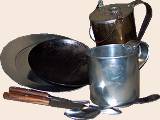
Tin plate, canteen half, utensils, tin
cup and boiler
(Orchard Hill Sutlery, C&D Jarnagin) |
Vendors:
C&D
Jarnigan,
Orchard
Hill Sutlery, Jersey
Skillet Licker, Regimental
Quartermaster, Otter
Creek Tinware
24.
Other Items
There are several more items you
will probably want to purchase including:
Pocket knife
Can Boiler
Musket wrench
Nipple pick
Rifle cleaning oil
Cleaning patches for the rifle
Housewife
Comb
Mirror
Toothbrush and toothpowder
Handkerchief or towel
Soap
Matches and match safe
Hardtack
Gloves
Scarf
Wallet
Pocket Watch
Pipes
Hemp cord
Manuals of Drill |
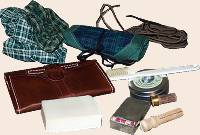
Poke sacks, Housewife, Leather Laces,
Wallet, Lye Soap, Toothbrush and Toothpowder, Matches,
Tompions

 
Pocket Knife, Hemp Twine, and Hardtack

 
Gloves, Scarf, and Gun Cleaning Kit (Wrench,
wiper, cone pick, patches)
|
Please
consult other members before making any purchases. They will
help guide you in the right direction so that you do not waste
money on incorrect gear.
Required
Uniform and Equipment:
Frock coat, federal issue or civilian
shirt, trousers and suspenders, socks, brogans, Hardee hat,
waistbelt, cartridge box and sling, cap box, canteen, haversack,
blanket, gum blanket, rifle-musket, bayonet and scabbard.
|

![]()
![]()
![]()
![]()



































